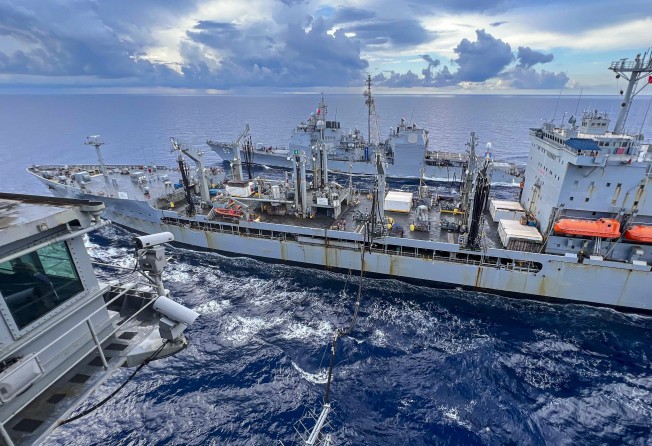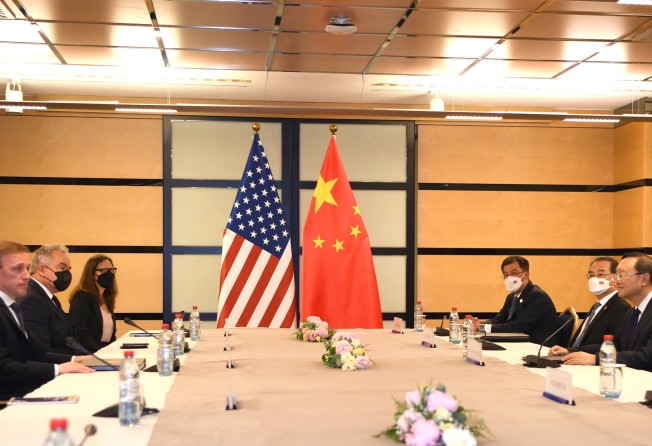Leader of US House Armed Services Committee calls for both dialogue and deterrence to deal with China
- ‘The world is in fact big enough for the both of us, and we need to look for opportunities to try and convince them of that,’ says US Representative Adam Smith
- On a separate panel, experts discuss a war-game exercise they recently held to identify how the US and allies could deter China from invading Taiwan

The US needs to bolster its relations with allies, modernise its military and work with China and Russia to reduce nuclear weapons, the chairman of a key congressional committee overseeing the US military said on Wednesday.
But Washington should also try and keep the door open with Beijing, added Representative Adam Smith, a Democrat from Washington state, at a time when relations between the two nations are at a historic low amid rising tension over Taiwan, trade, espionage and the South China Sea.
“If we can find a way to get along with China, to get China to recognise that it’s not a zero-sum game, they’re hung up on this notion that they’re going to bury us,” said Smith, chairman of the House Armed Services Committee. “We’re not going anywhere. And neither is China. China’s going to be a big powerful country. The world is in fact big enough for the both of us, and we need to look for opportunities to try and convince them of that.”
Smith, speaking at Centre for a New American Security conference, added that if the US hopes to effectively counter Beijing and Moscow as they undermine the international rules-based order, it needs to come to terms with a multipolar world in which a more humble Washington convinces rather than pressures allies.
“At the end of the day, what will you do if China attacks Taiwan, nobody knows. And you’re not going to know until it happens,” said Smith. “This is where the diplomacy piece of it comes out. We have to get these countries on our side.”
Smith added that there was significant resistance to modernising the US military from several quarters but that China’s rapid rise showed how important the effort is.
Lawmakers are often very reluctant to shelve expensive ships or planes that aren’t effective solely because they are being built in their district, he said.
The Pentagon is extremely bureaucratic, all too often concerned with process than results. And military contracts are only concerned with making money, he said. “There are incentives for all three that go in the opposite direction,” he said. “Rome wasn’t built in a day.”
At a separate panel at the CNAS conference on Wednesday, lawmakers, former military officials and China think tank experts also discussed a war-game exercise they held recently to identify how the US and its allies could deter China from invading Taiwan and prevent a war “while still positioning themselves to defend Taiwan and defeat China’s aggression should deterrence fail”.
The war game was set in 2027, with Taipei having elected a hard-line pro-independence government, Beijing amassing troops near the island and the United States bracing for a Chinese invasion.
As the game unfolded, participants said on Wednesday, the China side launched a pre-emptive attack on Guam, Japan and the Philippines and an assault on Taiwan, hoping to gain the edge on the assumption the US would come to Taipei’s defence anyway.
The US countered by attacking China’s ships and supply lines at which point China, feeling cornered, launching a nuclear weapon near Hawaii that did not cause damage to US territory but was meant to serve as a warning of China’s will to fight at all costs.
The organisers ended the game there, assuming that a long slog would follow.

Some expressed surprise at the outcome.
“What kept occurring to me with this tabletop exercise was how quickly things kept escalating despite efforts to de-escalate,” said Representative Mikie Sherrill, a Democrat from New Jersey and also a member of the House Armed Services Committee, speaking on Wednesday at CNAS, who played on the US side. “Certainly the nuclear attack was completely surprising.”
US-China tensions over Taiwan have been increasing as ties over trade, security and espionage fray. During a meeting this week in Luxembourg, US National Security Adviser Jake Sullivan called for stability in the Strait while top Chinese diplomat Yang Jiechi underscored Beijing’s sovereignty claims and territorial rights.
Defence chiefs from the two nations sparred over Taiwan at a meeting in Singapore over the weekend even as the two sides argued over whether the island lies in international waters.
Those participating in the war game exercise said they relied on several assumptions that might not bear out by 2027, including significant US investment in long-range missiles and stronger ties with the Philippines, assuming Manila agreed.
Other givens: that Taiwan will focus far more on nimble drones, hardened communications and cruise missiles instead of ships and aircraft that China could more easily destroy, drawing on lessons from Ukraine’s defence after Russia’s invasion on February 24.
Participants in the games added that they expected China to draw various lessons from Russia’s recent military mistakes, making it likely that, in the event of an attack on Taiwan, Beijing would commit huge numbers of troops from the start and strike fast, rather than waiting on the border, as Moscow did.
“If [Chinese President] Xi Jinping’s timeline is the only three years or five years or even shorter than that, then that creates more incentives for China to use more escalatory means against Taiwan to achieve unification,” said Bonny Lin, a fellow at the Centre for Strategic and International Studies and a former Pentagon official, who played for the China team.